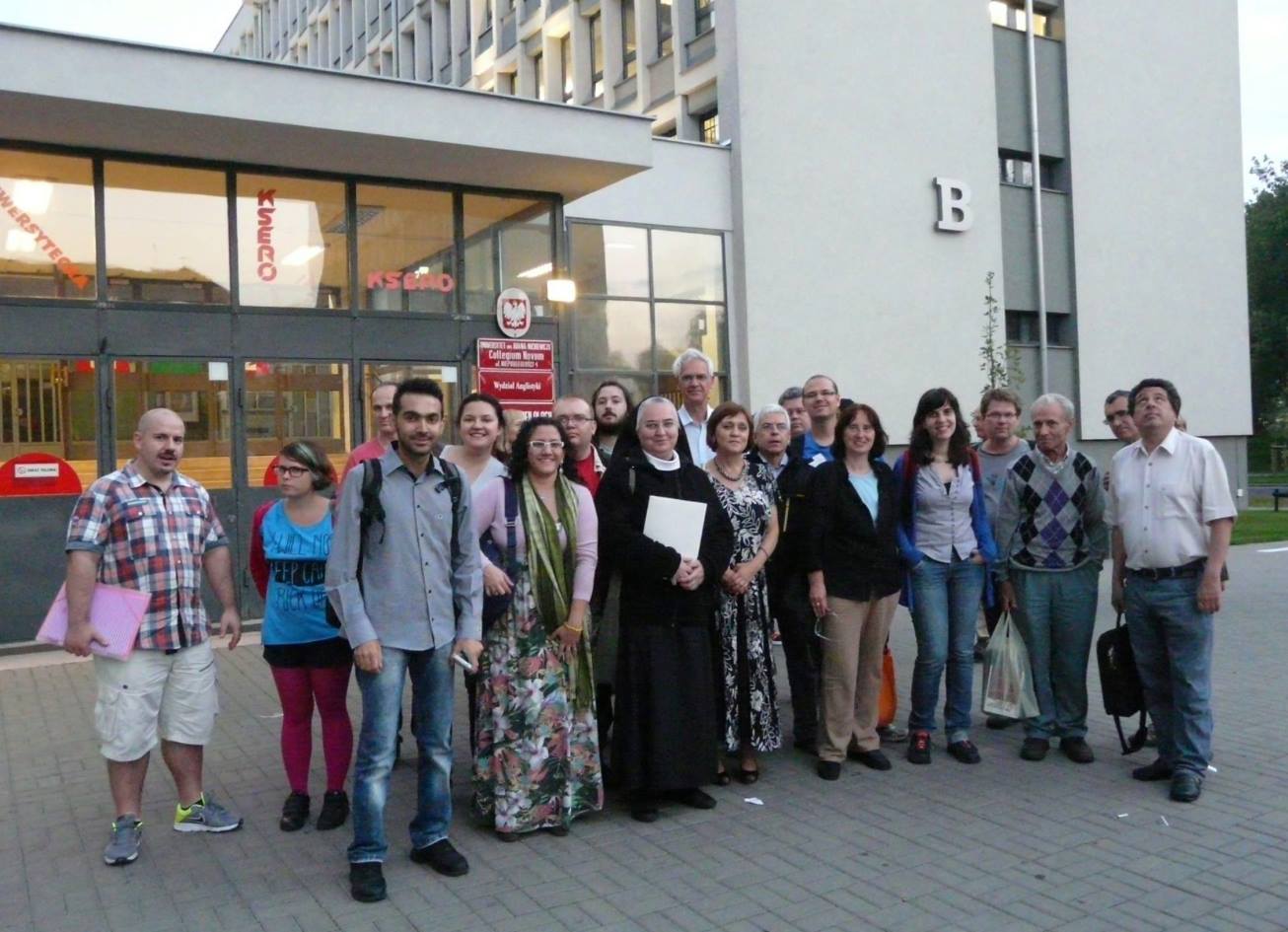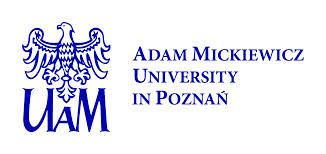AFTER THE FIRST SESSION, SEPTEMBER 2014

In the photo: Group 2014-2017
Record levels of interest in Interlinguistic Studies at Adam Mickiewicz University in Poznań
On September 20, the newest group of students began their program of Interlinguistic Studies with 26 participants from 14 countries (7 from Brazil, 3 from Poland and Spain, 2 each from Slovakia and Sweden and 1 each from Belgium, Croatia, the Czech Republic, France, Hungary, Iran, the Netherlands, Russia and the United Kingdom). It is the sixth group since 1998. They were welcomed by the vice dean of the Faculty of Modern Languages and Literatures, professor Aldona Sopata and the director of the program, professor Ilona Koutny.
Enthusiasm in Brasil has clearly grown despite its great distance from Poland and has brought in fresh color to the European palette. Recruitment this time took place on a larger scale thanks the website edukado.net , the Universal Esperanto Association (UEA) and the Esperantic Studies Foundation (ESF). The latter has given basic scholarships to 13 of the participants. Edukado.net successfully launched a campaign to help defray travel expenses to Poland for some students. ESF recently began the campaign "AMU Poznanon!" ("LOVE Poznan!") for the next semester since regular participation requires great dedication from students. Heartfelt thanks go out to all who have so far helped.
During the weeklong instensive session for the first semester, Vera Barandovská-Frank (Germany, professor of AIS) led a course in interlinguistics which gave an overview of planned languages. Ivan Colling (Brasil) who just completed his interlinguistic studies at AMU also contributed. Zbigniew Galor (professor of Szczecin University in Poland) introduced the students to Esperanto culture. Interesting lectures were also given on language and culture by professor Sabine Fiedler (Leipzig University, Germany), Esperanto newspapers by Jukka Pietiläinen (docent at Tampere University in Finland) and on Esperanto radio by Barbara Pietrzak (Polish Netradio, board member of UEA).
The initial period of Esperanto literature was discussed by Tomasz Chmielik (translator from Poland) and the Krakow based poet Lidia Ligęza. Classes in phonetics and phonology, from basic concepts to a description of the sound system and standard pronunciation of Esperanto were given by Ilona Koutny and Nicolau Dols Salas (professor of University of Balearic Islands, Spain). Concise presentations and discussions of the subjects will be followed by essays to be completed at home.
The session also saw the final exams of previous students and 7 persistent individuals (3 from Brazil, 1 each from German, Hungary, Lithuania and Switzerland) presented the interesting results of their work. These were Ivan Colling (Is the polished mirror flexible and friendly? Some considerations on logic, regularity and simplicity in languages), Guilherme Jardim (Analysis of relations between Spiritism and Esperanto in Brazil), Rita Moraes (Two similar ways: John Francis and Vargas Llosa), Anja Christina Stecay (Function of places in criminal novels), Snaiguole Malych (Is the behavior of esperantists other with not esperantists than with esperantists?), Mireille Grosjean (Communication in Africa) and Szabolcs Szilva (Classificaton of planned languages). Information on the theses will appear on the website edukado.net. The students intend to continue their research.
The one year instructor training (AMU in partnership with ILEI and edukado.net) was completed by 5 participants (Annie Grente and Marielou Cochard from France, Martin Ptasinski from Germany, Luis Ladeira from Portugal and Karina Oliveira from Brazil) and obtained teaching certificates from ILEI. May they apply what they've learned successfully!
The session was followed by the third Interlinguistics Simposium (25-26.09.2014) with the main theme international communication. It was opened by the pro-rector of AMU and the vice-director of the Institute of Linguistics also spoke. Papers in Esperanto, Polish and English were given on topics related to language policy, intercultural communication as well as various aspects of Esperanto and Interlinguistics. The program and summaries can be found at the Interlinguistic Studies webpage. Selected papers will appear in article form in the Institute of Linguistics journal JKI (Language. Communication. Information).
The banquet brought together old and new students, teachers and symposium participants in the agreeable atmosphere of the university dining room Jowita. Guests included vice-dean of the Faculty of Modern Languages and Literatures, prof. Maciej Karpiński and the director of the Institute of Linguistics, prof. Piotr Wierzchoń. The director of Interlinguistic Studies presented representatives of the Vienna Esperanto Museum, CDELI (Center for Documentation and Research on the International Language in La Chaux-de-Fonds, Switzerland) and Edukado.net.
The week closed out with the 30th Arkones, a well-known and very rich cultural gathering with music, film, theater and discussion groups. Many lecturers and students of Interlinguistic Studies also contributed to the program.
Many photos from this session are on the website Edukado.net (Fotoalbumo "Poznan 2014 septembro").
Interlingvistikaj Studoj

